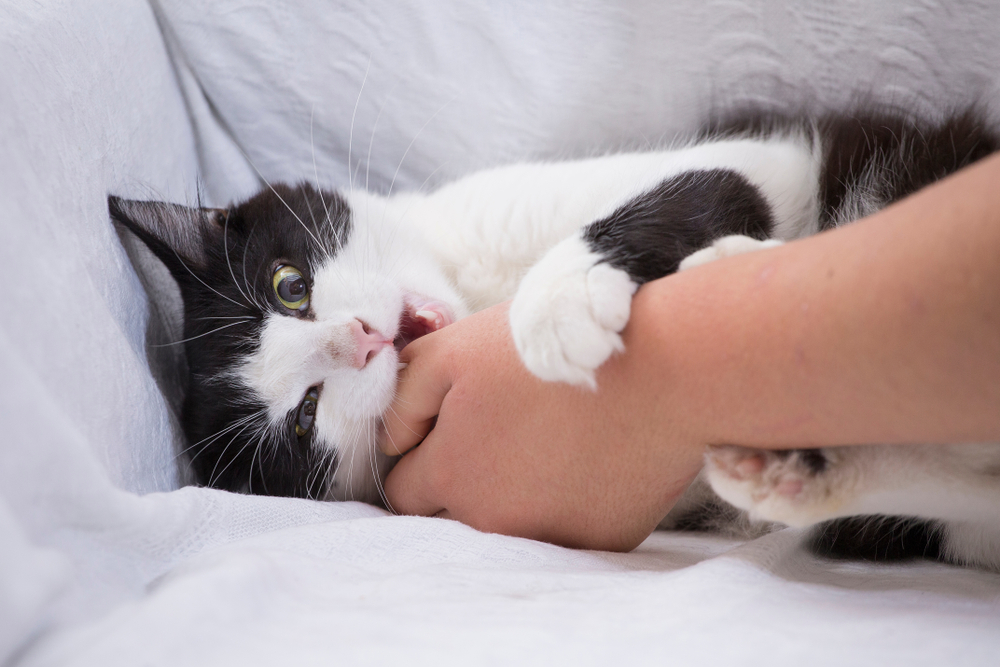
You love your pet—absolutely everything about them—except for that one thing that drives you nuts, or causes you concern. At Livermore Family Pet Hospital, we understand that certain pet behaviors can cause headaches for their owners. Let’s work together on the problem behavior, so that we can determine possible solutions.
Probable causes for common pet problems
Rest assured that every problematic pet behavior has a reason. If your pet is experiencing a change of environment or routine, or is taking a new medication or dosage, they may have anxiety, and behave differently to seek comfort. They may be seeking attention because of boredom. They may be battling physical discomfort, and attempting to let you know that they need help. Here are some common problematic behaviors, and possible causes:
- Digging — Digging can be more prevalent in certain dog breeds, particularly hunting breeds, but dogs instinctively dig for many reasons, sometimes to try to cool off from the sun, for example, or to hide a prized possession.
- Vocalizing — Barking, meowing, and whining are types of vocalizations, or a means of communication. A pet who is excessively vocalizing is trying to let you know that they have been alerted to something desirable or threatening.
- Separation anxiety — Separation anxiety can be a serious problem, and can put a strain on your bond with your pet. A pet suffering from separation anxiety often acts out almost immediately after being separated from their owner. They frequently vocalize excessively, or become destructive with inappropriate chewing, urinating, and defecating.
- Biting or aggression — A dog who has been pushed beyond their threshold will show their teeth and growl, and may bite.
- Chewing — Chewing is natural for dogs, but not chewing on door frames, furniture, or important papers—or your shoe.
- Scratching and licking — Are you missing the corner of your couch or ottoman? Cats give themselves manicures and mark their territory through scratching.
- Chasing or jumping — Do you ever feel too nervous to walk your pet, fearing their behavior when they see another walker or animal? Chasing and jumping are instinctive behaviors, but are potentially harmful and risky, especially if the dog is not trained appropriately.
- Inappropriate elimination or spraying — If your pet is not in the middle of being house-trained, and starts inappropriately eliminating or spraying in your home, they may be trying to let you know they are stressed or in pain.
Possible solutions for problem pet behaviors
If you are confident that your pet’s behaviors are not because of a lack of training, they may simply need more quality attention and activity to redirect their undesired behaviors. But, you must also pay close attention for physical signs, such as confusion, lethargy, touch sensitivity, appetite change, or inappropriate elimination. Your pet may be experiencing a health problem that is the cause of their poor behavior. Here’s what you can try in each case:
- Digging — Your dog needs to know where they can dig. Designate a specific area (e.g., a sandbox), consistently redirect them, and reward them when they use the specific area, to teach them that everywhere else is off-limits. When you do stop them digging in the wrong place, ensure you redirect them somewhere, rather than not allowing them to dig at all.
- Vocalization — With close observation, you can usually figure out why your pet is trying to get your help or attention. They may simply need to be distracted, to decompress through safe play, or be reassured that they are safe.
- Separation anxiety — If your pet’s clinginess is concerning you, they may need some comfort strategies, and, in extreme cases, possibly medication. Let our veterinary team examine your dog for a medical cause, and to decide whether calming supplements (e.g., Solliquin, or Zylkene), compression wraps, calming music, pheromone therapy (e.g., Adaptil collars, and diffusers), or anti-anxiety medications may help. If your pet has signs such as lethargy, in addition to being clingy, they may have a health issue, such as hypothyroidism, that needs veterinary care.
- Biting or aggression — Sometimes a teething or curious puppy simply needs to learn basic bite inhibition through training and socialization. If your puppy bites you, say “Ouch!” loudly, and redirect them to an appropriate chew toy. Older dogs who suddenly start biting or showing aggression are likely experiencing cognitive dysfunction, or are in pain (i.e., joint pain, or dental disease). If your dog attempts to bite, a veterinary assessment can help you determine whether they are in pain, or affected by cognitive decline.
- Chewing — Excessive chewing typically means your dog is unclear about what they can chew, but if they repeatedly have been redirected to their appropriate chew toys, they may be bored, and need more exercise to use up their energy. Try walking your dog more frequently, or setting aside regular playtime, to ensure that they are sufficiently stimulated and expend more energy.

- Scratching and licking — If your cat knows where their scratch post is located, and their nails are trimmed, but they are still scratching your sofa, try Feliscratch by Feliway. Dogs typically scratch from anxiety or boredom. If your pet is excessively licking or scratching themselves, they need veterinary attention to check for issues such as allergies or infection.
- Chasing or jumping — Consistent training is key to stop your dog chasing or jumping. The goal is for your dog to always pay attention to you, which basic training can accomplish. Always ensure your pet is leashed or confined, and supervised when outside. Remember to step to the side without making eye contact if your dog attempts to jump on you, or others, so you ignore, rather than reinforce, the unwanted behavior, and reward your dog only when they have four paws on the floor.
- Inappropriate elimination or spraying — If your pet has not been properly housebroken, they need basic, consistent training to redirect this unwanted behavior. Other reasons for inappropriate elimination or spraying include stress from being bullied by another household pet, pain from a health issue such as a urinary tract infection or arthritis, or cognitive dysfunction, especially in older pets.
You may find that some degree of pet behavioral help is warranted when home-management techniques are not doing the trick. If your pet’s behavior is becoming impossible for you to manage, alarming you, or straining your relationship, contact us at Livermore Family Pet Hospital. Our veterinary team can help identify why your pet is behaving inappropriately, and how they can be helped.

